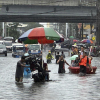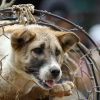People on the Cham Islands off Hoi An say wild monkeys are invading their homes and stealing their food.
Pham Minh Vuong, 30, was taking a nap after lunch on a mid-December day as a troop of monkeys woke him up running “noisily” across the roof of his house on Cham Islands.
Vuong said the monkeys descend upon villages from their wild lives in the mountains and are increasingly launching incursions both day and night.
“Our little baby gets startled at night and cries because of the noise caused by the monkeys,” he said.
The monkeys often sneak into his house looking for food, Vuong said.
The clever mammals have learned how to unplug the rice cooker, open the lid and wait for the rice to cool down enough to eat.
“I don’t dare leave any fruit or snacks on the altar because monkeys love that stuff,” the islander continued. “After eating all the food there, they break the flower vase and other items they find on the altar [in search of more],” he added.
Vuong was born and grew up on Cham Islands. He has witnessed how the wild monkeys have evolved over the years.
In the past, they kept away from humans but they’ve become aggressive over the last three years as more and more tourists visit.
Tourists usually leave fruits and snacks around, said Vuong, and so the monkeys have found a new source of food and have gotten used to the trappings of human life and are no longer scared.
Wild monkeys disturb local houses on Cham Islands, December 2022. Video by VnExpress/Dac Thanh
Cao Thi Phuong, owner of a homestay on the islands, said groups of five to seven monkeys usually pay long “visits” to her home from early in the morning until the evening.
“I run a homestay so I cannot lock the door,” she said. “To prevent monkey [intruders], I have to repeatedly hide the food in different places because they find it very quickly.”
Phuong said the monkeys eat all the fruits in her garden and damage cables, causing power, internet and TV signal losses.
Nguyen Van Vu, deputy head of the management board of the Cham Islands Marine Protected Area, said the monkeys on Cham Island go by the scientific name Macaca Mulatta and belong to the endangered and rare wild animal group 2B, which means they have yet to face extinction threats, but are at risk if not managed properly, in accordance with Vietnam’s laws on wildlife protection.
To prevent the monkey from intruding on local people’s property, Vu said the board has prepared a research proposal, but it has no funding for implementation.
While waiting for research and evaluation, people need to cut off any food source available to monkeys, barricade their houses and store their belongings carefully, he said.
It should also be a rule that tourists are not allowed to give food to monkeys in order to gradually encourage the cute little beasts back into the habit of foraging in the forest, he added.
Cham Island lies 18km from Cua Dai Beach in the historic town of Hoi An. It was recognized as a World Biosphere Reserve by the UNESCO in 2009.
Around 3,000 people live on Cham Island and it’s eight smaller neighboring islets.
During the summer, the Cham Islands attract over 4,000 tourist visitors a day.
- Reduce Hair Loss with PURA D’OR Gold Label Shampoo
- Castor Oil Has Made a “Huge” Difference With Hair and Brow Growth
- Excessive hair loss in men: Signs of illness that cannot be subjective
- Dịch Vụ SEO Website ở Los Angeles, CA: đưa trang web doanh nghiệp bạn lên top Google
- Nails Salon Sierra Madre
 VnExpress News The News Gateway of Vietnam
VnExpress News The News Gateway of Vietnam






